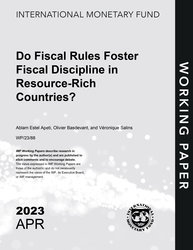
Do Fiscal Rules Foster Fiscal Discipline in Resource-Rich Countries?
This paper investigates the performance of fiscal rules in resource-rich countries (RRC).
READ MORE...
Volume/Issue:
Volume 2023
Issue 088
Publication date: April 2023
ISBN: 9798400240584
$20.00
Add to Cart by clicking price of the language and format you'd like to purchase
Available Languages and Formats
| English |
Prices in red indicate formats that are not yet available but are forthcoming.
Topics covered in this book
This title contains information about the following subjects.
Click on a subject if you would like to see other titles with the same subjects.
Exports and Imports , Economics- Macroeconomics , Public Finance , Economics / General , expenditure rule , forecasting commodity price , oil exporter , revenue rule , debt rule , design matter , Fiscal rules , Fiscal stance , Terms of trade , Oil exports , Global
Summary
This paper investigates the performance of fiscal rules in resource-rich countries (RRC). Using panel data for 57 commodity exporting countries from 1976 to 2021, we find that fiscal rules: (i) reduce the procyclicality of real public expenditures with terms of trade in oil exporting countries, and (ii) improve non-resource primary balances in all RRC, especially during terms of trade upturns. The rules’ design matters. Addressing the procyclicality of public expenditures with terms-of-trade can be achieved with expenditure rules, and, for oil-exporters, revenue rules (althoug limited data on the latter calls for taking the results cautiously). To improve non-resource fiscal balances, debt rules and fiscal balance rules are shown to have a positive impact, especially in oil exporting countries. We further investigate the effect of fiscal rules and other features of the fiscal framework through case studies (for Botswana, Mongolia, and Timor-Leste). These cases highlight that even when fiscal rules are not fully complied with, they lead to some degree of fiscal discipline. The case studies also highlight the importance of the quality of fiscal frameworks: frequent revisions, lack of compliance or low stringency of the rules can significantly hamper their effectiveness.
Copyright © 2010 - 2026
Powered by:
AIDC



